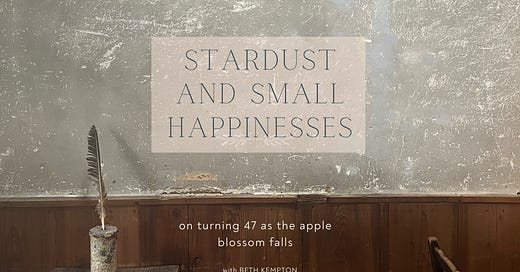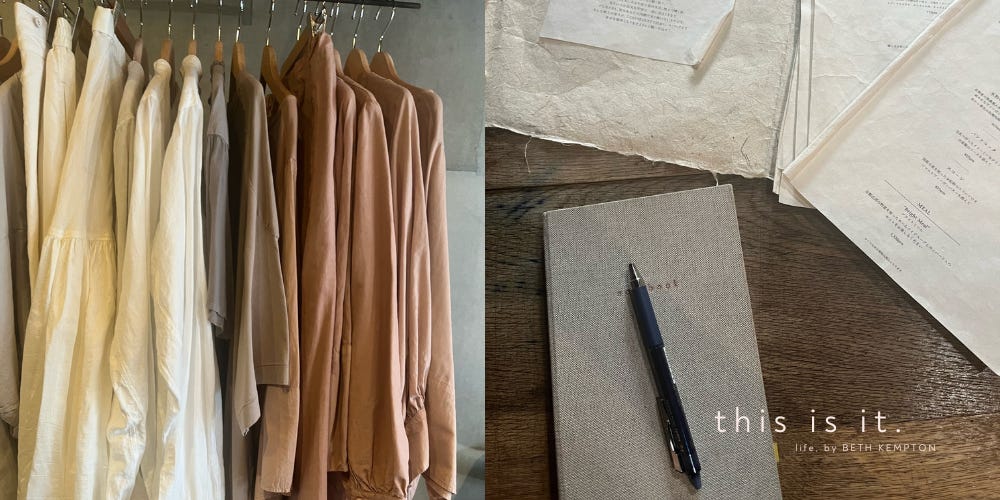There’s a tiny cafe down a back street of a residential area in North West Kyoto where I’d love to meet you for tea and cake. Here, let me draw you a map. You’ll find it next door to the florist which is also in an old house, so don’t get lost, or maybe do, and wander in to find exquisite displays laid out in the alcoves of tatami-matted rooms, then bow with apology and exit, taking the door on the left next time instead.
I’m here already, waiting, but don’t hurry on my account. I could stay all afternoon. I have never been in a café that feels beautiful in the way this place does. Just now I was offered a fork for my cake, presented on a piece of marble. It was set down gently on the old wooden table in front of me, with the words, Goyukkuri dо̄zo (ごゆっくりどうぞ), Take your time.
This place is called Stardust. The owner, Kana Shimizu, reminds us in thoughtful words in the washi paper menu, that there is beauty and wonder and alchemy inside each one of us and we are not different from everything else.
This is a place where bad things never happen. Where the staff float around inviting you to take your time, leaving the scent of fig and peony in their wake. Where everything I have ever wanted to say about the wabisabiesque aesthetic is laid out on the uneven, unfinished walls. Where everything is natural and organic, mismatched but perfectly together, wooden furniture, unkempt greenery, a high ceiling with imperfect walls. Beauty everywhere.
It is a place where you can take down a book from Kana’s personal collection and read about metaphysics, old wisdom, or places far away. When I was there a few moons ago, I picked up a book about animal spirits, it fell open at the eagle. Always the eagle. Then I flicked to a random page and it was the bat, a symbol of death and rebirth, apparently. Given that I was at Stardust on a research trip for Kokoro, this could not have been more apt. ‘The Universe is always asking you to grow and become your future,’ it said.
I went to the bathroom, out through a small garden at the back, and passed a wooden screen, from somewhere in Central Asia perhaps, and I had a flashback to riding the Trans Siberian Railway nearly three decades ago, where I met a couple who had built a house back home and were travelling the world buying furniture for it. I remember trailing them into a huge shop in Ulaanbator as they looked at mirrors and wooden benches. I was a penniless student, heading back home after a year abroad, barely able to pay for my dinner. I didn’t buy anything. My only souvenirs from Mongolia were a terrifying memory of getting lost in a crowd during the Nadaam festival, and the photos I took on an old square camera and developed myself in the makeshift dark room in our garage at home – folk on horseback, wide-eyed children offering me fermented milk, the empty, vast landscape of the Steppe.
At Stardust there was gentle piano music playing. There were wicker baskets for handbags and feathers for luck. I sat there alone on the verge of tears, so overcome was I with the feeling of the place. Never before had a café made me want to cry, but that one did.
I wrote in my journal, ‘Here at Stardust I feel so at home, as if I have been here before. My soul is happy. Aesthetically the place is so Japanese, and yet it feels like it has the spirit of the Himalayas echoing in the walls. It calls to my wanderer self in a way that travel in the modern world does not always do.’
Trying to put my finger on what it was that was so utterly captivating, I keep returning to one phrase, ‘chiisa na shiawase’ (小さな幸せ).
It’s a phrase an old friend had said to me not long before, when we had been sat in Mos Burger in a far northern town, eating spicy cheeseburgers wrapped in crackly paper and served on plastic trays. My friend, who is one of the most cheerful people I know, looked tired. Several years ago she quit a job she loved to take care of her mother, who has Alzheimer’s among other things and is bedridden. Her situation understandably makes her grouchy, sometimes even violent, and my friend carries all of the burden, but never complains. ‘How do you keep going when it’s hard?’ I asked her. She thought for a moment, looking off into the distance, then hit upon her answer. ‘Chiisa na shiawase,’ she said. ‘Small happinesses, like half an hour here with you, eating Mos Burger and laughing and remembering old times. Like getting a new notebook, or an unexpected letter, like folding paper cranes, or sitting with a cup of tea in the early morning light.’
Thinking about this now I realise that it is small happinesses that have kept me going too, through this past difficult year. My children’s laughter. Chats with Mr K. The first yellow rose of the year. Walks at dusk. Ginger cake for breakfast. Jazz playing while I take a bath. Snail mail. The tiny fragments of beauty which lay amid the dust and shattered dreams, the dark clouds containing all that will not be. Beauty is always waiting, in the shadows, and sometimes in the light. Sometimes it is the shadow. Sometimes it is the light.
またいつか広大な宇宙の一部に戻るときまで、どんなときも、星はあなたの内側で光り輝いているのです。Until the time when your light returns back to the universe, you carry the brightness of the stars inside of you.
- Kana Shimizu, owner of Stardust
It’s my birthday today. This time last year I was sitting in the old tartan armchair in my writing room, searching for the perfect poem. ‘Pick something beautiful,’ my mum had said. I reached for the anthology Finding the Way Home1 and it fell open at a short verse by Ōtagaki Rengetsu, a nun, potter and poet who was born more than two centuries ago, but captured human life in a timeless way. Rengetsu, whose name means ‘Lotus Moon’, lived a tragic yet beauty- filled life. Her poem spoke of the way we accept the graceful falling of mountain cherry blossoms so much more easily than we let go of our attachment to the world. It was my forty-sixth birthday. The night before, there had been a full moon and a penumbral lunar eclipse. Later that day, our nation would see the coronation of a new king. But all of that seemed unimportant as I sat by the window in the dawn light, thinking about how, in three days’ time, I would be hosting my own mother’s funeral.
As I sit here now, a year on, looking out at the mist hovering above the fields in the distance and a lone black crow sitting on the telegraph wire, it’s hard to believe I have circled all the way around the sun without her.
It is hard to fathom that I have somehow stumbled through a year of birthday parties and school reports and various life crises and moments of celebration without her. If you have lost someone this past year, or anytime before that, I know you know what I mean, and I am sending love to you.
I miss her. I’d give anything for a 47th birthday card in her handwriting. But instead I will eat cake with my family and remember what she taught me: We get to have this day. To wake up and be grateful for every one we get.
As I wrote in Kokoro, we have agency, but we are not in control. We have to take risks, and love deeply, and soak up the sweetness of life wherever we can, because we never know how long we have. The only thing we know for sure, in any given moment, is this: We are here. We are alive. We are the lucky ones.
Each morning we wake up we have the chance to remind ourselves, ‘I get to have this day.’ We don’t know how many more times we will get to do this. Maybe thousands, maybe just hundreds, maybe only a few more times.
Doing-time or being-time. Wasting time or making time. We get to choose.
I know what I’m choosing. More joy. More wildness. More small happinesses, appreciated fully. More life lived in the awareness of the strangeness and magnificence of all of it, right here, right now.
I get to have this birthday, and I am grateful for every single one I get to enjoy. I am grateful for the precious people who fill my life, especially those who show up even when it’s hard. I am grateful for you, my most beloved community, and to every single one of you who has sent love and kindness by DM and comment and email and things in the post throughout this past year. Each one has been a small happiness.
Blossoms scent the air a carefree birdsong echoes truth. - Gozan
Glancing out of my window I can see pale petals all over the grass and I am reminded how yesterday my children set up an obstacle course in the garden and how, when we were busy stepping through hoops and balancing balls and skipping with a twisted rope, the wind picked up sending apple blossom from the old tree whirling through the air. Suddenly we were dancing in a blizzard of petals, laughing, together, and I remember thinking to myself, This is it. This is no small happiness. This is everything.
May we always notice such things, and may our lives be full of them.
Happy birthday to me.
Tell me, what are the small happinesses in your life? I’d love to know.
Beth Xx
PS ✨A SPECIAL GIFT FOR YOU✨
Thank you so much to everyone who has posted a review of Kokoro. It makes a huge difference in helping readers know if a book is a good fit for them. As a token of my gratitude for your time, I am offering a beautiful 15-minute Golden Sphere visualisation for connecting with your inner wisdom. Just leave a review on Amazon, Goodreads or wherever you bought Kokoro and then send a screenshot of your review to learning@dowhatyouloveforlife.com and we will send you a link to download the audio. Enjoy!
Finding the Way Home edited by Dennis Maloney (White Pine Press)
The haiku by Gozan can be found in Japanese Death Poems edited by Yoel Hoffman (Tuttle)
All photos taken at Stardust by Beth Kempton except for the last image, taken by Holly Bobbins Photography.













Beautiful and moving. Small happinesses - something I try to live by, but a new phrase to carry with me and remind me of the importance of the little things. Thank you for sharing.
Happy birthday, Beth. So many thoughtful insights to accepting and enjoying we are given!